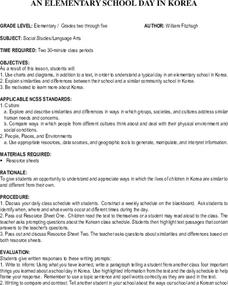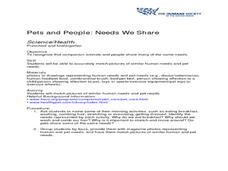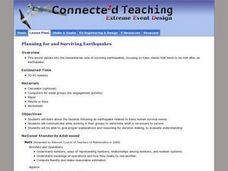Curated OER
An Elementary School Day in Korea
Students study the similarities and differences between their school and a school in Korea. In this culture study lesson, students discuss and list their classroom's weekly schedule. Students then read about a Korean class schedule and...
Curated OER
What Makes a Habitable Planet?
Students list conditions necessary for humans to survive. They then mix yeast with a nutrient broth consisting of warm water and table sugar in a plastic bottle, capping it with a party balloon and compare the factors within the bottle...
Curated OER
Human Evolution
Students recognize that achievements of human beings throughout human history can be considered part of the ongoing story of human evolution. They research settings such as the biosphere and Mars and write imaginative short stories using...
Consortium for Ocean Science Exploration and Engagement (COSEE)
Carbon Dioxide & Krill: Impacts
What effects do temperature and carbon dioxide levels have on the zooplankton of Antarctica? This concluding lesson plan in a short unit on climate change and the ocean helps environmental scientists answer these questions. After...
Consortium for Ocean Science Exploration and Engagement (COSEE)
Ocean Acidification: Whats and Hows
Open this lesson by demonstrating the production of acidic carbon dioxide gas by activated yeast. Emerging ecologists then experiment with seashells to discover the effect of ocean acidification on shelled marine organisms. They measure...
California Academy of Science
Color Vision Genetics Evolution Simulation
At one point, all mammals carried only two color receptors, but now most humans carry three. An informative presentation and hands-on activity demonstrate how this evolved through genetics. By participating in the activity, pupils...
Baylor College
Digestion
Digestion is an amazing and complicated process that provides humans with the energy they need to survive. Lesson six in this series on the science of food uses sliced turkey and a meat tenderizer to demonstrate how enzymes help break...
Curated OER
Pets and People: Needs We Share
Students match pictures of human and pet needs. In this comparison lesson, students describe their morning activities and identify the needs represented by each activity. Students work in groups to find magazine pictures representing...
Curated OER
Understanding Human Rights Through Music And Poetry
Tenth graders discuss human rights. They brainstorm and listen to and read examples of music and poetry that deal with human rights and oppression. They choose one poem or song to analyze, looking for theme, oppression, and historical...
Curated OER
Global Eyes
Twelfth graders consider global issues and their effects. They identify the themes of human needs, human rights, and the environment, select a topic and research articles for a Global Current Events Portfolio. Working in small groups,...
Curated OER
My Hometown
Students identify the basic requirements needed for survival and identify the resouces needed for survival that are found within their own community. They use craft materials to create a model of it and then. create a color key to...
Curated OER
Managing Wildlife
Students explore the relationship between wildlife and humans in northern New England. They also brainstorm ideas on why they think some species are greater in population than others in a given area.
Curated OER
Change or Adaptation
Students identify the adaptive forces in the life cycle of plants, animals, and humans, isolate and identify the role that change and adaptation play in extreme environments and research and write a short term paper using MLA citations.
Curated OER
Planning for and Surviving Earthquakes
Students work in small groups to explore the FEMA for Kids site. They take the role of FEMA officials. Student list three items they may need to survive an earthquake. They complete a worksheet and discuss their results with the rest of...
Curated OER
I Want It! I Need It!
Students compare the difference between needs and wants. In this needs vs. wants lesson plan, students play a sorting game with picture cards, depicting illustrations of survival needs and material things. Students sort the picture cards...
Curated OER
Animal Adaptations
Students expand their knowledge of animal features and behaviors that can help or hinder their survival in a particular habitat. They participate in classroom discussions and visit a website to research animals
Curated OER
Naturally Disastrous!
Students explore, research and examine the causes of natural disasters and how to survive them. They research on the internet world climate, recent disasters, how they happen, what to do if one occurs and what preventive measures to take...
Curated OER
From Foraging to Farming
Sixth graders understand the basic needs of humans. In this basic needs lesson plan, 6th graders participate in an activity to search for their basic needs. Students recognize the problems when their is scarcity of a necessity to their...
Curated OER
Sizing Up the Supersize Croc
Young scholars examine and compare traits of humans and crocodiles. In this crocodile lesson students use a ratio to estimate the height of a person and compare that to a crocodile.
Curated OER
The Gulf of Maine
Students examine the effect of limiting factors, especially when it comes to human beings. They examine data from the Gulf of Maine area.
Curated OER
Mammal Morphology - Bats, People, and Other
In this physical characteristics worksheet, students compare bats and humans by putting a + sign in the chart for whether or not bats and humans have the same characteristics. Students do this for 17 characteristics and answer 3 questions.
Curated OER
Trails of Understanding: The Earliest Immigrants
Students research Native American tribes. In this human migration lesson plan, students determine how tribes lived and established cultures. Students create PowerPoint presentations that feature their findings.
National Wildlife Federation
What's Your Habitat?
How are third graders like rabbits? They both live in habitats and require food, water, and shelter to survive! An educational science lesson encourages your learners to think about their own habitats and survival needs, before comparing...
Advocates for Human Rights
Refugees and Asylum Seekers
To gain a deeper understanding of the plight of refugees and asylum seekers, class members read stories written from the point of view of an emigrant, map the individual's journey, and note the human rights affected by each stage of the...
Other popular searches
- Human Survival Needs
- Human Survival Inquiry
- Human Survival Food
- Human Survival Inqiry
- Human Survival in Wilderness
- Rules of Human Survival

























